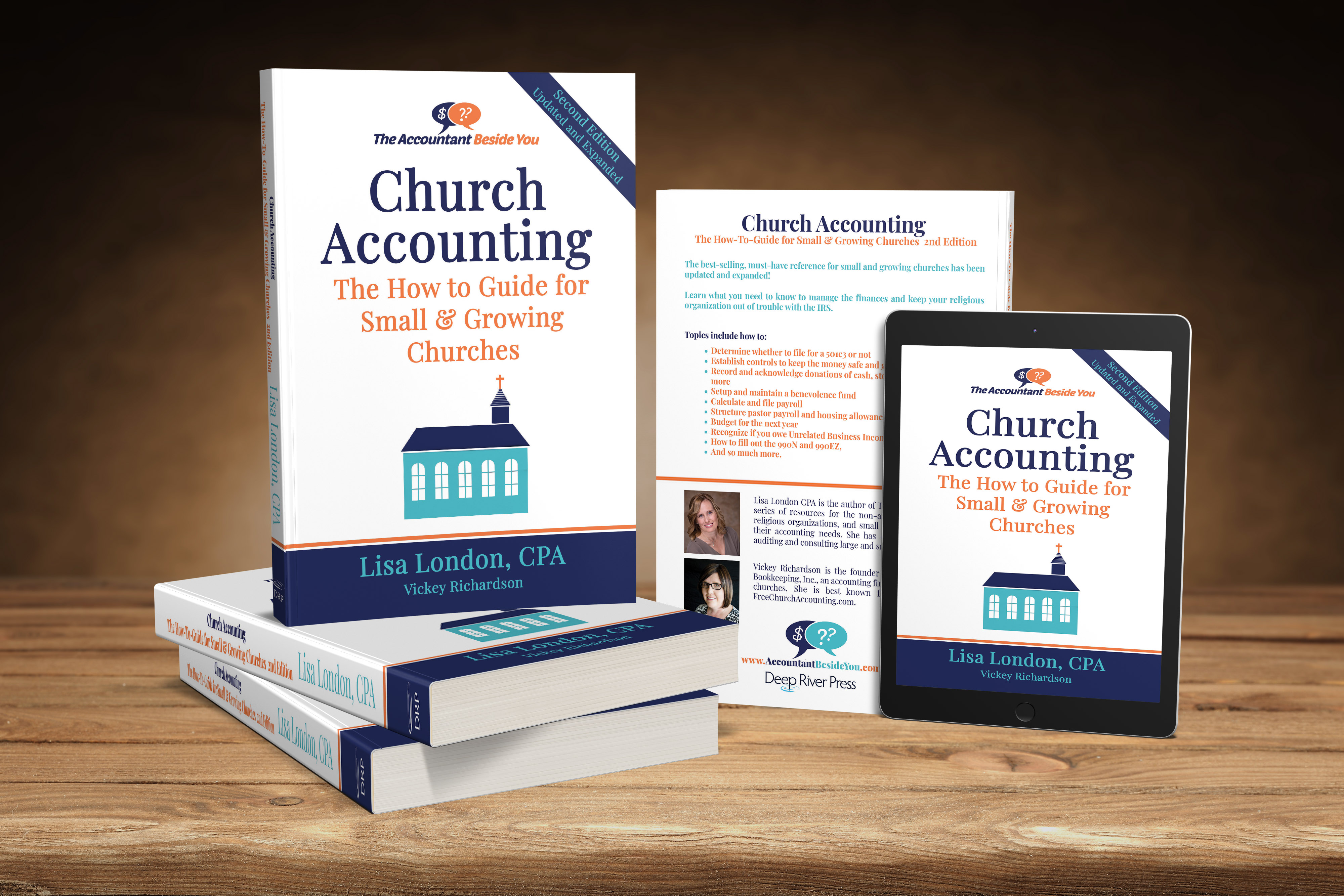
Accountable reimbursement plans are a valuable resource for
most churches and nonprofits. Most experts recommend even the smallest churches set up an expense
reimbursement policy for their pastor and staff to use.

An accountable reimbursement plan is an employee reimbursement arrangement or method for reimbursing employees for legitimate business expenses.
If set up correctly, reimbursed business expenses do not have to be treated as taxable income.
See this page for instructions on setting
up and administering an accountable reimbursement plan.
However, an expense
reimbursement policy could turn into a
nightmare for a church and their minister and/or staff if not done properly.
If a minister or church is audited and there is not
proper supporting documents backing up the reimbursement claims, the
reimbursements could be considered income for the minister or staff member.
They would then owe penalties for not claiming the income…and it snowballs from
there.
Adopting Appropriate Policies:
Before reimbursing employees, your church or nonprofit organization should ensure all of their tax-exempt funds are being properly expended by adopting appropriate policies such as the following:
- Accountable Reimbursement Policy
- Credit Card Policies and Procedures
- Travel Reimbursement Policy
See some tips on creating these policies on this page: Creating an Accounting Policy Manual. There are also some free sample policies available for downloads on that page.
3 Requirements:
This How To Book for Churches is packed full of tips for:
- setting up internal controls,
- cash out-controls for debit/credit cards
- setting up an effective fund accounting system,
- handling and tracking contributions,
- setting up compensations for a minister,
- handling a payroll for a church
- preparing nonprofit financial statements,
- and much more.
There are 3 requirements for an effective and “legal” accountable reimbursement plan.
They are:
- Must have a legitimate business purpose for every reimbursement
- Must require employees to substantiate expenses
- Must require employees to return any excess reimbursements
The last 2 components must be handled within a “reasonable time”.
According to IRS Pub 463, the definition of “reasonable time” “depends on the facts and circumstances of your situation. However, regardless of the facts and circumstances of your situation, actions that take place within the times specified in the following list will be treated as taking place within a reasonable period of time”.
The following methods meet the “reasonable time” requirements:
The fixed date method applies if:
- an advance is made within 30 days of when an expense is incurred or paid.
- proper expenses are adequately substantiated within 60 days after they were incurred or paid.
- any excess reimbursement is returned to employer within 120 days after the expense was incurred or paid.
The periodic statement method applies if:
- a periodic statement are issued (at least quarterly) by the employer that requests employees to either return or adequately account for outstanding advances and that they must comply within 120 days of receiving the statement.
Accountable Reimbursement Plan Tips:
- Get supporting documents such as receipts and mileage logs!
- Properly file them!
- Appoint someone to be in charge of administrating the
accountable reimbursement plan.
Make sure they know what an
appropriate business expense is and what is not and the time limit for
obtaining the supporting documents.
The IRS requires the employer to keep good accounting
records. Every reimbursed expense must include the following information (the 4Ws):
- Who was reimbursed and if for a business meal…whom were they with….and where were they?
- When were they reimbursed?
- What were they reimbursed for and … for how much did it cost?
- Why were they reimbursed (was it a legitimate “business”
expense)?
Mileage Reimbursement Rules :
- Do Not reimburse your minister for travel back and forth from his home to the church (it is considered commuting miles). Consult a tax professional for exceptions to that rule!
- Do reimburse them for trips to hospitals, nursing homes, member’s homes, etc.
- Do Not fill up a staff’s gas tank for church business. The IRS frowns on this practice. Their view is that if you fill up their personal vehicle’s gas tank than they will have to prove that they used every drop of that gas for church business or they want the value of the personal miles on that tank of gas added to their income…nit picking I know…but it is the IRS and they are famous for it:)
- Do use a mileage reimbursement form. A better way to handle reimbursing staff for using their own vehicle for church business is for them to use a mileage log and/or a mileage reimbursement form like the one in my Spreadsheet Package and turn in to the church for reimbursement at the mileage rate stated in your policy.
- A helpful article: What You Need to Know About Mileage Reimbursement

Do Not …
…give the left over funds in your accountable reimbursement plan to any staff person including the minister at the end of the year. It would null and void your whole policy and you would have to include all reimbursements for the year on a W-2 as income.
Last but still very important…include wording in your accountable reimbursement arrangement that would allow your minister/staff to claim unreimbursed expenses on their personal taxes IF the church could not afford to reimburse those expenses.
I read an article on StartChurch many years ago on this very issue. Even though this article was written back in 2012…it still applies to accountable reimbursement policies today. (The link to that article is located at the bottom of this page.)
The article stated that in a recent court case, Stidham, T.C. Summ.
Op. 2012-61, the court ruled that a taxpayer is not entitled to take a tax
deduction for unreimbursed businesses expenses if the employer has a
reimbursement policy.
This ruling may impact small churches that are not always able to afford all
reimbursements. The author pointed out that churches may need to amend their accountable reimbursement policies to include wording that would require the church
to send a written reply to the requesting employee recognizing their
claim as legitimate but also denying it according to its reimbursement
policy on the basis that it cannot afford to issue the reimbursement.
The Church Accounting Package includes an ebook on Minister Compensation and Taxes that covers accountable reimbursement plans. It includes:
- How to set up and administer
- Examples of supporting documents
- Example of resolution
- Reimbursement Tips
Accountable Reimbursement Plan for Meals
I have been asked this frequently enough that I am adding it on to this article…just so I can point my clients to it =)
Can we reimburse our Pastor for meals?
When I am asked this question…my answer is always…”It depends.” Here is what I ask to figure out whether they can lawfully reimburse or pay for pastoral meals. (This goes for my non-profit administrators too.)
Was it a “business” meal? If not, then no…you cannot reimburse or pay for their “personal” meals.
If yes…do you have an approved accountable reimbursement plan in place? If you don’t have one…get one set up as soon as possible because you can’t legally reimburse those “business meals” tax free without a proper AR policy in place.
If you do have an AR policy, was the meal or entertainment directly related to church/ministry/nonprofit organization business? Startchurch posted a great article on that subject: Are There Limits on Pastoral Lunch Expenses?
They include some great guidelines on when it is proper to include the spouse in that meal/entertainment reimbursement too.
If it was for business purposes…make sure and DOCUMENT whom were they with and the purpose of the meeting. I tell my clients to flip over that meal receipt and quickly jot down those details, so they will be able to remember them when they turn those receipts in and fill out a expense reimbursement form.
And finally…there are different situations where “meals” can be reimbursed or paid for with your church or organization’s check or debit/credit cards. Make sure you outline them in your AR policy. For example, paying for meals while traveling is different than the Pastor taking a guest speaker out to lunch. They need to be recorded separately in your accounting and have different guidelines in your AR policy.
Most policies state that the organization will pay for meals when traveling over 75 miles from home. However, I had one potential client get upset with me when I told him …even with a proper AR policy in place…the church could not legally pay for that daily donut and coffee stop and lunch stop for himself and if I was doing his bookkeeping …those meal expenses would have to go into Box 1 of his W-2. His reasoning was that he was about town doing church business and the church should pay for his meals. I explained that even though I am out all day visiting clients…my business cannot reimburse me for the meals I eat out …unless I am meeting a client for lunch AND there is a business purpose involved OR I was at a conference over 75 miles from home. He didn’t hire me =)
Follow the guidelines in this article and research IRS publications and topics that relate to employee expenses and write detailed accountable reimbursement guidelines to include with your Accountable Reimbursement Plan, so everyone will know what you can legally and properly reimburse/pay and what you cannot.
Reference:
Dan Busby’s Church and Nonprofit Guide
Richard Hammar’s Church and Clergy Tax Guide
Raul Rivera’s Auditing Reimbursements; An Easy Win For the IRS









